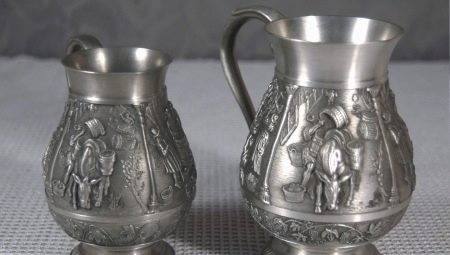Tin dishes do not apply to everyday kitchen items. During the Middle Ages, it was very popular and was found on tables only among noble people. Outwardly, pewter is very similar to silver, so it was often a welcome purchase among German burghers.

History
Germany is considered the birthplace of the reference tin craft, where the first metal deposits were discovered in ancient Saxony. And also in medieval Britain, tin products were especially popular. The improved quality of the metal alloy, grinding using the new rotary machining technique significantly elevated tin over silver products and opened up the possibility for the industrial production of tableware from it.
Features
Tin has always been considered an inaccessible and expensive mineral due to its "modest" deposits. For the same reason, it is the fourth of noble metals, giving way to platinum, gold and silver. Today, tin products also have aesthetic and practical value.
Exquisite wineglasses, glasses, tin plates, cigarette cases, frames, writing instruments with various decorative elements and patterns will be not only a wonderful present, but also a luxurious addition to the interior.
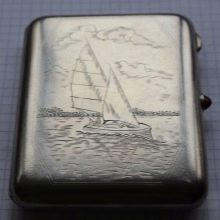
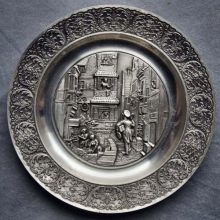
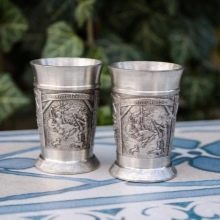
For the manufacture of tin products, not pure metal, but alloys are used. 95% of tin is commonly used, and the remaining 5% may be from copper or antimony. Such a compound is absolutely safe, it does not interact with food, is not oxidized and has no smell.For the same reason, dishes prepared in tin dishes retain the maximum benefit, since they practically do not lose vitamins and taste.
It is believed that pewter can cause significant harm to human health. However, this is possible only if there is lead impurities in its composition, the presence of which will be indicated by the soon darkening of the product.
To preserve decorative qualities and extend the life of tin dishes, certain care conditions must be observed:
- long-term storage of food in dishes is not allowed;
- due to the “softness” of the metal, washing in a dishwasher is not recommended, as well as cleaning with hard brushes and aggressive detergents;
- You can remove contaminants from tin products using warm water and a soft sponge with a small amount of dishwashing detergent;
- To polish tin products, you can use a polish for silver or brass, which is applied to a soft cloth and carefully distributed over the surface;
- metal utensils should be dried on a special dryer or a towel.
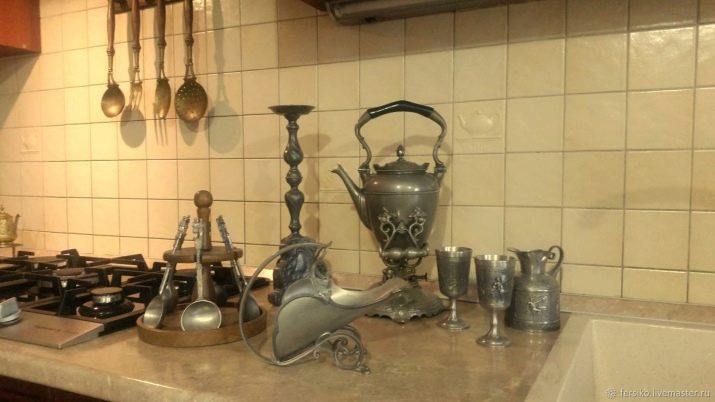
Manufacturing companies
When choosing a souvenir or tableware made of tin, preference should be given to reliable manufacturers with a good reputation who have the appropriate certificates of product quality.
Today, one of these companies is the Austrian-German brand. Artina SKS, which for 50 years of existence in the European market has positively established itself in the field of production of decorative tin products.
Of particular interest are the jubilee collections of dishes, the theme of which is Germany and its cities, as well as hunting, fishing. Unique tin plates, beer mugs and decanters decorated with elaborate bas-reliefs and prints will become a memorable gift for a festive event.
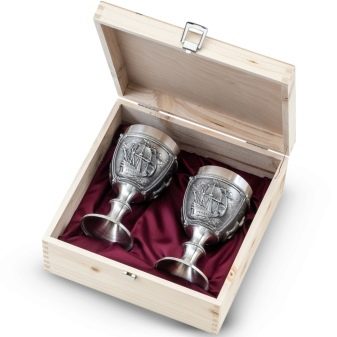
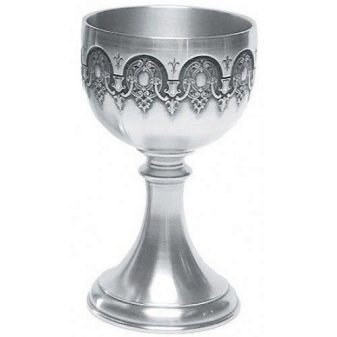
Italian company Cosi tabellini engaged in the production of tin products since 1954. Own production factory produces more than 400 items of cutlery, dishes, interior items (vases, lamps, mirrors), as well as desktop and other accessories (ashtrays, magnifiers, calendars). Impeccable design, originality of forms, manual work on each product are a guarantee of Italian quality and comply with EEC standards.
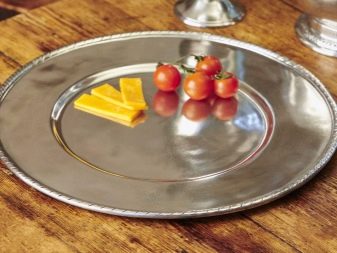
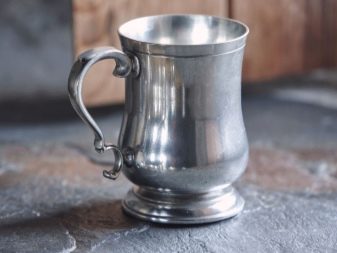
Another reputable manufacturer of tin souvenir and tableware is an English company. English pewter, founded in 1977 in Sheffield. The production is based on the use of a special alloy of tin and copper - a puter, the quality of which is noted by world art lovers.
Very popular are beer mugs and pocket flasks decorated in the Celtic style, as well as other decorative items.


It should be noted that high-quality tin product has a considerable cost. Often, unscrupulous manufacturers produce products from low-grade alloys (with a small amount of tin), as the suspiciously low price of goods may indicate.
Advantages and disadvantages
The main advantages of pewter are justified by the positive reviews of collectors and art lovers, of which it should be noted:
- absolute non-toxicity of metal;
- oxidation resistance;
- food in tin dishes preserves its beneficial properties and natural taste;
- attractive design;
- "Solid" and status version of the gift.

Despite most of the advantages, pewter has some minor flaws, these include:
- the rarity of the natural mineral, the laborious process of manual processing significantly increase the cost of the product from it;
- the porous structure of the metal, which excludes washing in the dishwasher and long-term storage of food in the dishes;
- periodic need for grinding products;
- a large number of fakes.
Tin products are rightfully considered a sign of luxury and wealth.The mineral composition of the metal is absolutely safe for health, which allows it to be used for the production of utensils and cutlery. Their unique design and practicality will add a twist to any interior and will surely attract the attention of collectors and fans of medieval culture.

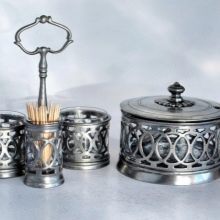
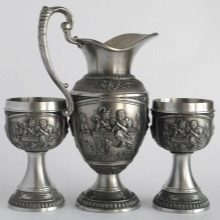
An overview of quality tin dishes is presented in the next video.
